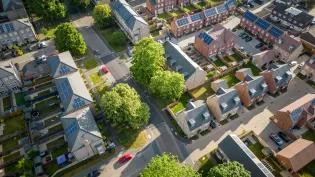The hubs will explore ways of retrofitting properties to create healthy Net Zero homes, and examine how measures to cut emissions can also improve the health of vulnerable populations.
Professor Ruth Doherty of the School of GeoSciences will play a leading role in both hubs. Professor Doherty will work closely with Professor Jamie Pearce and Dr Andrew Schurer, also of the School of GeoSciences, and Dr Mark Miller from the Centre for Cardiovascular Science.
Each of the hubs will receive up to £6 million to deliver high-impact research.
Indoor environment
While outdoor air pollution is known to be harmful, the health effects of complex mixtures of air pollutants indoors are not well understood.
The Indoor HABItability during the Transition to Net Zero Housing Hub (INHABIT) aims to develop solutions for Net Zero housing that improve indoor air quality, health and inequality outcomes for the UK population.
INHABIT will collaborate with stakeholders to explore strategies for achieving the health and environmental benefits of home retrofitting – including enhancing indoor air quality and reducing mould and damp – to promote both physical and mental health and well-being.
The research will help to deliver societal benefits such as healthier indoor environments, lower healthcare costs, reduced energy bills, and improved social equity.
Extreme weather
The National Hub on Net Zero, Health and Extreme Heat (HEARTH) will examine how the transition to Net Zero can benefit vulnerable populations by improving health outcomes.
The HEARTH team aims to develops solutions that support climate goals while delivering health benefits such as reducing heat-related illnesses and improving living conditions during extreme heat events. The research will assess these benefits in various settings including homes, care facilities, hospitals and prisons.


